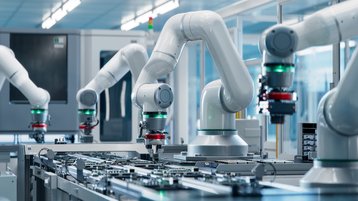This year, will we see the development of new perspectives on AI, will no code zero code dominate, or can intelligent automation, combining RPA (Robotic Process Automation), AI, and Process Orchestration, reveal the genuine value of digital workforces?
We've compiled insights from experts, customers, and analysts to forecast automation trends for 2024.
These predictions offer a glimpse into areas of innovation and investment, shaping business operations, enhancing organizational efficiency, and elevating customer experience. This snapshot is based on our annual in-depth report revealing the continued advancement of AI and the digital workforce.
The realm of possibilities in 2024
The relationship between generative AI, intelligent automation, and task mining will accelerate transformation to achieve more strategic outcomes.
Governments are also likely to increase environmental, social, and governance (ESG) obligations requiring companies to make more use of data to meet green targets and sustainability reporting.
Citizen development will become more accessible to employees as generative AI makes everyday language the common code for development, opening a world of possibilities.
Strategy is key
With operational and R&D budgets tightening, process orchestration journey planning is more vital than ever.
As more companies turn to process orchestration in 2024, IT teams will need to be more strategic, better define the automation journey, and measure success.
Integration of enhanced user experiences will also be under the microscope. This reduces obstacles for customers, enabling them to leverage broader portfolios and technologies.
The evolution of the generative AI ‘process wrapper’
Consuming generative AI through the process wrapper of intelligent automation serves as the linchpin of effective data governance, enhancing the accuracy, security, and accountability of data throughout its lifecycle.
Further sophistication in large language models (LLM) and generative AI will simplify automations that tackle complex and hard-to-automate processes.
According to IDC, large enterprises will rely on AI-infused processes to enhance asset efficiency, streamline supply chains, and improve customer satisfaction.
Privacy and AI governance to take center stage
From the EU’s AI act and the US Government, we will see more regulations fall on companies, further cementing regulatory reporting, and delivering an intelligent automation sweet spot.
Security and governance look set to be the number one priority for IT and compliance teams as organizations gain traction with gen AI and citizen development continues to expand.
‘People-first’ automation
Traditional long-established businesses face stronger competition from agile competitors ‘born digital’, putting increased pressure on productivity and efficiency.
The Asia Pacific region will lead rapid growth in the adoption of IA (intelligent automation) among mid-market segments in 2024, with a focus on value, beyond cost efficiency and labor savings.
Most enterprises will leverage no-code automation tools to scale digital transformation initiatives and democratize AI, unlocking new or previously untapped value for their organization.
Companies will also focus attention on extracting value from complex integrations from a single vendor.
Synergy between generative AI and intelligent automation
Generative AI and intelligent automation are hugely complementary and already transforming the way people think about work. Gartner predicts that – by 2026 – more than 100 million humans will work hand-in-hand with ‘robocolleagues’ while at work.
We expect control frameworks and human-in-the-loop intervention validation will be key trends in 2024, as people look to take advantage while protecting their businesses from risk.
Capitalize on business value with simplified user experience
The first wave of automation was driven by the excitement that non-developers could create automations using no-code or low code.
The successful IA vendors in 2024 will be the ones that unify automation components through common interfaces enabling non-technical users to drive automation.
Unification of intelligent automation
The automation industry and analysts are broadly aligned behind a common suite of technologies that are needed for a business to drive enterprise scale and strategic automation programs.
As generative AI evolves and becomes more integrated across the automation portfolio, the adoption of cloud-native platforms supporting easy scaling and operational management across the combined automation suite will become more important. APIs will become increasingly key to automation strategy.
No-code process orchestration evolution
Process orchestration will further evolve as organizations adapt to new technologies while maintaining legacy systems.
IT teams will adopt no-code and citizen developers to make upgrades simpler and more user-friendly. Process orchestration will also continue its path toward an end-customer journey view from a business optimization view.
With the growing volume of data and regulations, process orchestration will require robust security measures.





